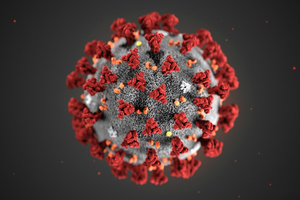COVID-19 Infection Survey participants thanked for ‘huge contribution’ to pandemic response
UKHSA, ONS and the University of Oxford are thanking over 500,000 people from across the UK for their contribution to the COVID-19 Infection Survey.

Set up in April 2020, the COVID-19 Infection Survey (CIS) regularly gathered and analysed more than 11 million swab tests and 3 million blood tests from households.
The results have helped to provide vital weekly data on virus positivity levels across the UK, details on new variants, the characteristics of those who had the virus and their antibody levels and details of long COVID prevalence. This helped develop an understanding of COVID-19 and inform government decision-making throughout the pandemic.
The widespread rollout of the COVID-19 vaccine programme, together with improved treatments for the most vulnerable, has enabled the transition to living with COVID-19. This means the approach to COVID-19 surveillance is being actively reviewed by the UK Health Security Agency (UKHSA) to ensure it is proportionate, cost effective and considered alongside how we monitor a range of other infectious diseases that present a similar risk to the public’s health.
UKHSA will confirm details of any new surveillance surveys that continue beyond 31 March 2023 in due course. In the meantime, data collection for the COVID-19 Infection Survey will be paused.
Professor Steven Riley, Director General of Data, Analytics and Surveillance at UKHSA, said:
The COVID-19 Infection Survey has been an important tool in helping us understand COVID-19 and we’d like to thank every single participant for the huge contribution they have made.
We will continue to ensure our surveillance activities remain proportionate and cost effective with the move to Living with COVID-19. Participants of the COVID-19 Infection Survey will be uniquely placed to support future surveillance activities and we and the Office for National Statistics (ONS) very much look forward to working with them in the future.
We remain committed to monitoring the threat posed by COVID-19 through our range of surveillance systems and genomics capabilities, which report on infection rates, hospitalisations and the risks posed by new variants.
Sir Ian Diamond, National Statistician and Chief Executive of the ONS, said:
The pandemic has been a formidable test of our ability to gather and analyse data quickly, and the unique value of the COVID-19 Infection Survey has been recognised worldwide.
The data from this survey has had an incredible impact on the country’s response to the pandemic, and its success instils confidence in the ability to stand up wider surveillance activities in future.
As UKHSA works to confirm its approach to COVID-19 surveillance, we plan to continue gathering valuable insight into the experiences of COVID-19 and other respiratory infections and long COVID in communities, and looking forward to continuing to work with CIS participants to do so.
Professor Sarah Walker, Chief Investigator of the survey and Professor of Medical Statistics and Epidemiology at the University of Oxford, said:
The COVID-19 Infection Survey is an extraordinary achievement, the successes of which have been driven by the selfless contribution of hundreds of thousands of people taking part across all 4 nations of the UK, as well as of several thousand study workers originally delivering home visits throughout lockdowns.
The data collected will continue to be valuable for many years to learn more about how COVID-19 infection and vaccination affect future health outcomes.
UKHSA continues to publish regular reports on COVID-19 and other infectious diseases, including through our weekly surveillance reports, which provide data on infection rates, hospitalisation numbers and vaccination uptake. We also maintain the ability to track the latest variants through our genomics capabilities, which assess the risks posed by different strains of the virus.
UK Health Security Agency press office
10 South Colonnade
London
E14 4PU